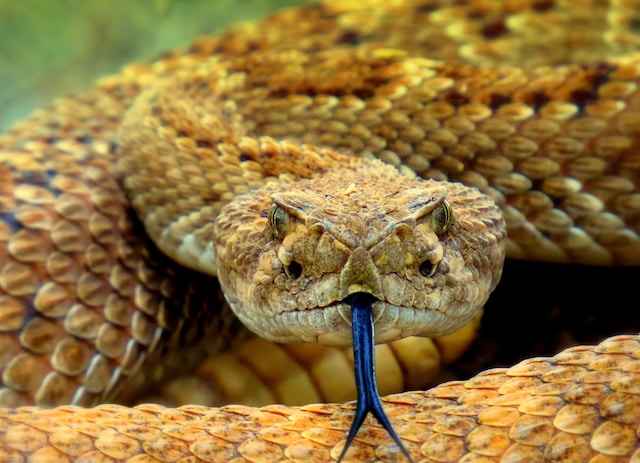The other night, I had a dream in which a group of us discussed a quote about “the serpents of our lesser nature.” The group hosted diverse viewpoints and one participant was a strident, cheerful Christian who spoke as though we were already in full agreement with her. I raised the point that the serpent was linked to both Jesus and Satan in the Christian tradition, and she laughed at me as though I was the most silly, ignorant person alive for coming to that notion.
This sparked a fierce anger that followed me into my waking life, whereupon I got out of bed to google research and confirm that what I said was true before I brushed my teeth. Thus I was reminded that Jesus, in John 3:14, likens himself to the serpent statue Moses lifted up to heal the Israelites. This led me to reread the story told in Numbers, and it is intriguing: it begins with the Israelites wandering the desert, following the leadership of Moses and their god. The wanderers complain of their suffering, the bad food, the lack of water, and this is what spurs their god to send the venomous serpents who killed many with their bites. Then the Israelites repent and recognize they’ve sinned against their god. Moses prays on their behalf, and god gives him the instructions to create the brazen serpent so that whosoever is bitten will survive the bite.
The serpent is thus venomous and medicinal. It kills and it heals. On its belly, it crawls on the surface of the earth engaged in the survival necessary for all animals with cunning and wisdom. Put on a pole and lifted up, it becomes a medicine, as in the staff of Asclepius. This is a common religious practice that shows up in all kinds of traditions: the figure who causes suffering turned into the protector against, and healer of, that suffering. Who better? In its original sense, a “hierarchy” is the arrangement of qualities by their proximity to divine. Our earthly survival would be lower, or perhaps lesser, than what is more connected to the divine source of things.
In the story from Numbers, I see so many serpents of lesser nature. The text suggests that the Israelites recognized their complaining and bitterness as a sin that incurred this punishment. If Moses had called me in to do therapeutic mediation between God and the Israelites, I would likely point out that it makes sense for a group that just escaped slavery to feel ambivalent about these conditions. After taking great risks and sacrificing much to escape, it might feel like things are worse in the desert with bad food and little water. I might encourage God to explore what about their complaints bothered him so much, and see if he could communicate his needs with a boundary instead of venomous snakes.
Yet it makes more sense to read this story like it is itself a dream, with the snakes a manifestation of the wanderers’ discontent. The venom might be akin to the emotional poison they inject into each other with their frustrations and resentments about an admittedly harsh and painful fight for bare survival. What’s intriguing is that when the Israelites repent, they ask Moses to pray for the removal of the snakes, but God does not fulfill that request. Instead, Moses is given instructions to make a medicine that instead heals those bitten by the snakes. There is no undoing, only transmutation. The poison itself may be part of the medicine.
A Jungian reading would see this at this as the mythological enactment of a psychological process by which the lesser serpent becomes the greater serpent. First we must witness the harm done from reactivity—when we lashed out because we felt scared, or weak, or small, or vulnerable. Then we transform that lashing out into the symbol of its healing, lifting it up to be witnessed and offered to those who offended us. We let everyone know that we see what happened, what transmitted the harm, and what can restore us back into health.
Yet this does not complete the process the dream is trying to enact in me. Dreams do not tell you what you already know, they point to what you need to recognize. In my own soul, I begrudgingly must wonder if the serpent of my lesser nature might the anger that motivated me to google Bible stories before my morning coffee, then wish I could go back to sleep to tell off that lady in my dream. As hard as it may be to believe, I think some folks might question whether that is a reasonable use of one’s precious life force. Being belittled, mocked, or thought stupid has been a big button in my life—it riles up all my protectors in a fruitless battle to demand to be taken seriously.
Which suggests that chipper, mocking Christian woman was herself another serpent of my lesser nature. For I can see her venom within me at my lowest points in life, when self-righteousness and sneering intellectual superiority sneak out to give my wounded ego a band-aid. Even when I think I’m calmly rising above a disagreement, the fangs come out. “I’m not going to argue about this,” I’ll say like an exhausted reasonable adult, immediately following it with a parting jab or argument that shows I am arguing about it. It’s dishonest. To name these vulnerabilities feels like giving a weapon to those who now know how to rile me up. Yet now here they are, woven to this pole, so I can lift them up as medicine.


